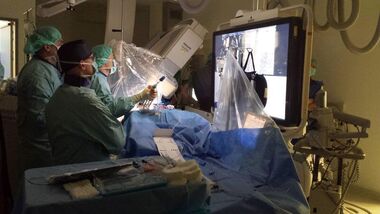Minimally invasive help for leaky heart valves

July 2017
"Cardioband" - New catheter technique provides an alternative to the proven MitraClip. Younger and inoperable patients benefit, the heart valve remains intact.
For the conservative, non-operative treatment of an insufficient mitral heart valve, a new catheterization procedure has recently become available at Heidelberg University Hospital. The "Cardioband" is used to pull the enlarged valve together so that the leaflets can close again. The first two patients, aged 33 and 36 years, survived the surgery without complications, and their complaints have improved significantly. The procedure, approved in 2016 for patients who cannot undergo open surgery due to concomitant heart insufficiency, offers an alternative to the proven MitraClip, where the non-closing leaflets are clipped together. With the Cardioband, the valve leaflets remain intact, so that further intervention is still possible at a later date without the need for valve replacement.
"Younger patients would be expected to derive the most benefits, since they are likely to need further heart interventions over the years," explains Prof. Dr. Raffi Bekeredjian, Director of the Cardiac Catheterization Laboratory in the Department of Cardiology, Angiology and Pneumonology at Heidelberg University Hospital, who performed the procedures with his team. "This option makes sense also if the MitraClip cannot be used for other reasons - for example, because the gap in the valve is too wide. A combination of the two techniques is also conceivable." So far, there are no study results indicating which procedure is particularly suited to which patients. Worldwide, approximately 200 patients have been treated with Cardiobands since 2013.
Each year, approximately 450,000 patients require hospital admission for cardiac insufficiency. At the Heart Center of Heidelberg University Hospital, expert cardiologists work closely with cardiac surgeons and the Department of Pediatric Cardiology so that they can optimize patient care. With the combination of severe cardiac insufficiency and valve insufficiency, patients have barely any resilience and suffer shortness of breath even with mild exertion. "Without valve repair, approximately half of the patients will die within five years," explains senior physician Raake. However, for many of these high risk patients, open repair is still too dangerous. With catheterization procedures like the MitraClip and now Cardioband, the patient is given general anesthesia, but the heart continues to beat and the heart-lung machine is not necessary. Procedure duration is also shorter than an operation. "Since the heart continues to beat normally, we can verify success immediately and readjust as needed," says senior physician Raake. With time, the band is incorporated into the tissue.
Before it can be considered as a routine treatment, further study results are required, stresses Professor Dr. Hugo A. Katus, Medical Director of the Department of Cardiology, Angiology and Pneumology. The authorization study showed that the intervention can be carried out safely and with low risk, that the backflow of blood is significantly reduced in most patients, and it results in immediate improvements in heart function. 50 high-risk patients at seven European centers were included in the study. There were no complications during surgery. The patients were more resilient and experienced less shortness of breath, thus, increasing quality of life. This effect was still evident even after two years. Further studies are ongoing.
Further information:
Department of Cardiology, Angiology and Pneumology at Heidelberg University Hospital

